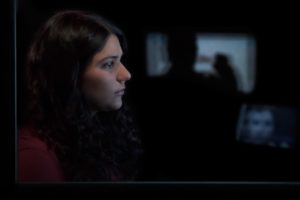
Ra’anan Alexandrowicz claims he was not conducting an experiment while filming “The Viewing Booth.”
The Israeli writer and director is known for his critical views of Israel, with his portfolio containing several documentaries depicting Palestinian strife in Israel and Gaza. At the beginning of “The Viewing Booth,” Alexandrowicz’s intentions seem no different.
Alexandrowicz, a graduate student at Temple University during the film’s production, invites a handful of Jewish-American Temple students and alumni to sit in a dark room in the university’s video lab. As the subjects watch video clips of the Israeli-Palestinian conflict from various media sources, Alexandrowicz observes from the adjacent room, asking them afterward if the videos shaped or changed their beliefs about Israel.
The film, now streaming on BBC Reel, spotlights one subject: Maia Levy, a Temple graduate who studied archeology. Her parents are Israeli and she is a stalwart supporter of Israel. Throughout the documentary, Alexandrowicz becomes less concerned with changing someone’s else’s opinion about Israel and more interested in just how opinions are shaped in the current climate of polarizing media and subjective truths.
In this way, the documentary becomes a very real experiment, or at least places media consumers — in the film and everywhere — under a microscope.
Levy is reflective and observant, the perfect prism through which to explore this project.
As she begins watching one of 40 available video clips, Levy is skeptical of what she sees. She shakes her head a bit, rolls her eyes, but watches each clip intently nonetheless, brows knitted in concentration.
The clips Alexandrowicz shows are disorienting. For an ignorant American ear who can’t tell the difference between Arabic and Hebrew when spoken muffled through masks and shouting, it’s challenging to tell who, Israeli or Palestinian, is the victim and aggressor in each clip.
Levy encounters the same issue. In one video, some Israeli boys are throwing rocks and shouting obscenities at a window of someone filming, likely an Israeli Arab. Levy leans into the screen a little closer, squints her eyes and pauses the video.
“These are Arab kids,” she repeats, first as a question, then as a statement with conviction.
As she watches the video, however, she realizes that, in this instance, the young Israeli boys are the aggressors. Levy is dismayed and disturbed,
but cynical.
“Then again, you have no idea what just happened before this,” she says.
Levy says this about a lot of the clips she watches, many of which are from B’Tselem, a resource center and video database that describes itself as “striving to end Israel’s occupation.”
The media source is clearly biased, cunningly using violent imagery and emotionally evocative sounds (sirens, babies crying) to elicit a response from its audience.
Yet Levy admits that she’s biased, too. Six months after her initial time in the viewing booth, she returns, this time watching her own reactions to video clips from half a year prior.
Alexandrowicz points out that the viewer has control over what they view. They make the choice to sometimes see only what will confirm their own opinions.
“I love Israel. This is personal … Of course, I’m making active choices,” Levy says.
Even with her acute self-awareness, Levy is unswayed by the video clips she watches.
At the end of the second viewing session, Alexandrowicz asks Levy through the intercom if she’s changed her mind, her beliefs, about Israel.
No, Levy answers.
Though Alexandrowicz perhaps set out to create a film to make a political statement about Israel, “The Viewing Booth” is not only a film about the Israeli-Palestinian conflict. For many American Jews, who are deeply, personally invested in Israeli politics, the conflict is a microcosm of an individual’s relationship with the media and how they wade through politics.
Since filming the documentary in spring 2018 and after the escalation of the Israel-Hamas conflict in May, Levy’s views of Israel remain unshaken, despite her many conversations with Alexandrowicz.
“I don’t think that we’ve particularly changed other’s minds; I think we’ve opened each other’s minds,” Levy said.
After her experience in “The Viewing Booth,” Levy is wary of media sources, recognizing how the media sensationalizes information, convoluting the truth.
“I definitely think media is really becoming entertainment,” she said.
“The Viewing Booth” exemplifies this: Rather than filming Levy directly, Alexandrowicz chooses to show her through a window or a computer screen at times. Instead of showing the clips Levy watches directly on the screen, a camera points at a computer monitor that is playing the clips. Even the audience incurs degrees of separation from what we’re watching.
In the face of the shortcomings of contemporary media, Levy offers a solution of moving through the world with careful curiosity. She encourages others to hold difficult conversations with those who have different perspectives, but also says to make up one’s own mind of what is factual beyond what is seen on a screen.
“It’s really important to remember what the goal is,” she said. “I don’t think the goal is particularly for one side or the other side to be right. The goal is to explore.”
[email protected]; 215-832-0741






